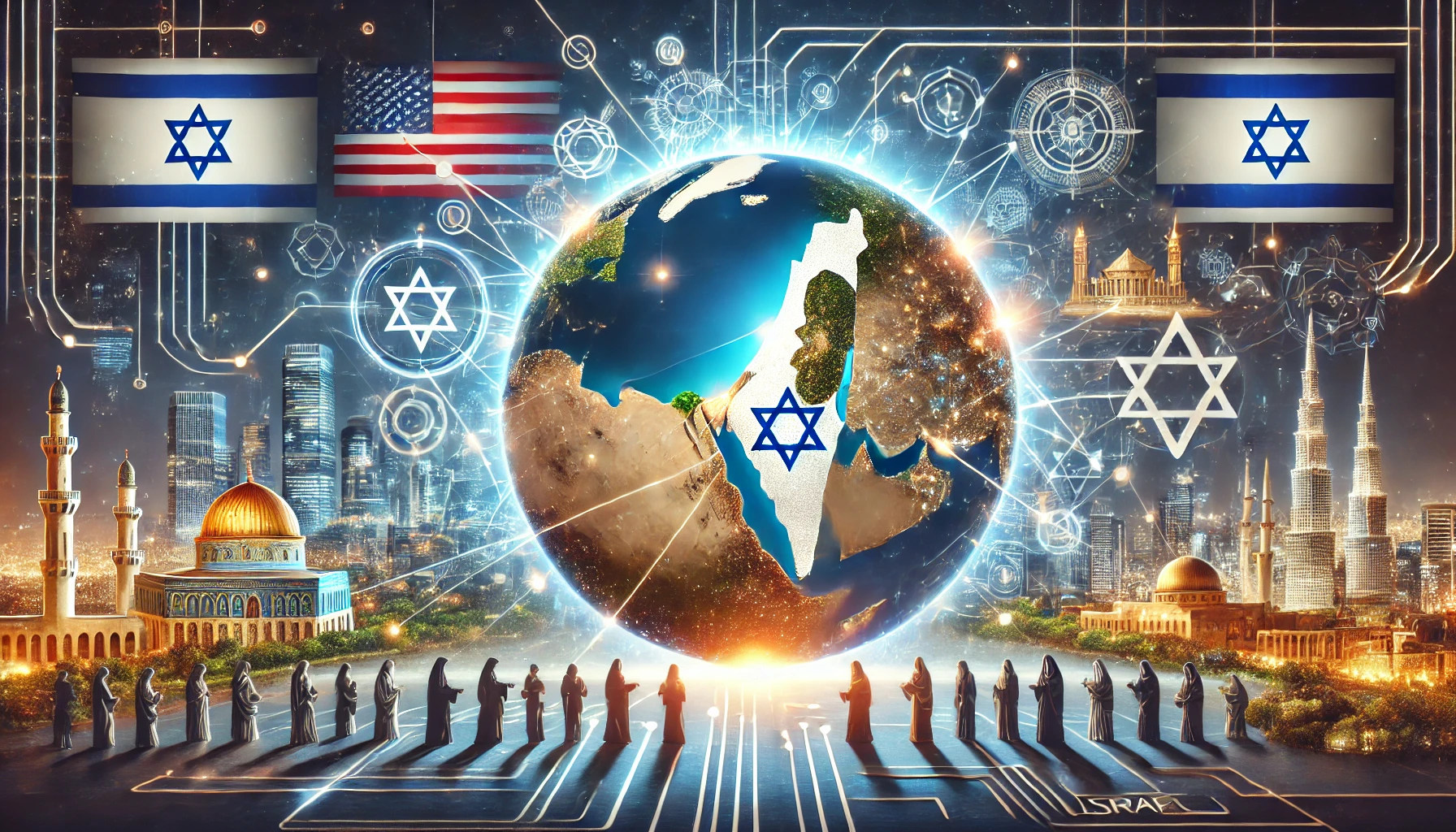
The New Middle East Through Israeli Eyes
Research Data on the Role of External Players
The modern system of international relations is undergoing a fundamental transformation. The United States and Russia are expanding their interactions and discussing global geopolitical issues in various regions of the world, from the Arctic to the Middle East.
The world built on the principles of globalization, dollar dominance and financial instruments, as well as the recognition of state borders exclusively through international institutions, is giving way to a new reality—a world of regional clusters and sovereignty over territories, which corresponds to the trends identified by Zygmunt Bauman in his works “Globalization: The Human Consequences” and “Liquid Modernity,” emphasizing the disintegration of the former global order and the strengthening of local identities and autonomies.
In this context, Israel must have a strategy for positioning itself in conditions where Russian troops, including with Israel’s participation, are strengthening their presence in Syria, the United States is asking for help from Russian leadership in negotiations with Iran, and Russia is planning to hold a joint summit with the League of Arab States.
Who Influences What?
The results of a nationally representative sociological survey conducted by the “Dor Moriah” Analytical Center in Israel in April 2025 together with the “Geocartography” sociological center not only allow us to assess Israelis’ perception of the role of various countries in regional peace processes, but also to trace the deep trends in the transformation of the world order, particularly noticeable in the Middle Eastern region.
Guarantors of Israel’s Existence
Indicative is the Israelis’ perception of the joint statement by the presidents of the United States and Russia that “Iran must not be allowed to threaten Israel’s existence”: 27.5% of respondents view this as an objective assessment of Israel’s right to exist, and 19.9% see it as an expression of Israel’s traditional relations with the United States and Russia as countries that initiated the creation of the State of Israel at the UN in 1948.
Incidentally, while Israelis quite predictably place the United States first among countries capable of influencing the internal political situation in Israel (47.1%), they also noted such potential for Arab countries (UAE, Saudi Arabia, Egypt, Qatar), Russia (14.6%), the EU (13.2%), and Iran (12.7%).
According to our research, Israelis identify four countries capable of exerting certain influence on achieving peace agreements between Israel and its neighbors: the United States, Arab countries (UAE, Saudi Arabia, Egypt, Qatar), Russia, and France.
While the United States and Arab countries can exert such influence on all of Israel’s military-political conflicts, Russia’s role primarily concerns Israel’s relations with Syria and Lebanon, and France’s role is limited to Lebanon.

Three Trends in the Transformation of the World Order
The observed crisis of the global system based on financial bubbles and liberal values is accompanied by three fundamental processes:
1. Clericalization of Political Narrative
In the context of the destruction of a world built on formal rules and international agreements, the religious-historical justification of a people’s right to a certain territory becomes a key factor in ensuring sovereignty. When the inviolability of state borders ceases to be a universally recognized international norm, it is the ontological justification that provides the legitimacy of the state and motivates citizens to defend their territory.
Our research data confirms this trend: religious Israelis demonstrate a much more pronounced sovereignty of thinking than secular ones. They are significantly less likely to believe in the effectiveness of external intervention in regional conflicts and the country’s internal politics:
- 48.1% of ultra-religious Israelis (versus 30.7% of secular ones) believe that no country can help resolve the conflict with Gaza
- 45.6% of ultra-religious (versus 31.8% of secular) believe the same regarding the conflict with Iran
- 47.5% of ultra-religious (versus 28.9% of secular) similarly regarding the situation with the West Bank.
These data indicate that a religious worldview, based on historical and theological ideas about the right to land, forms a higher level of sovereign consciousness, less susceptibility to external influence, and greater confidence in the nation’s own strength.
This trend is also observed in answers to other questions.
Thus, religious Israelis are significantly more likely than secular ones to believe that no external force can influence peace processes:
Regarding Gaza, the impossibility of such influence is reported by 30.7% of secular Israelis, 37.8% of traditional ones, and 48.1% of ultra-religious ones; regarding Iran – 31.8% of secular Israelis, 34.8% of traditional ones, and 45.6% of ultra-religious ones; regarding the West Bank – 28.9% of secular Israelis, 36.1% of traditional ones, and 47.5% of ultra-religious ones.
And the belief that no country can influence the internal political situation in Israel is reported by 25.3% of ultra-religious and 25.1% of traditional Israelis, which is 10 percentage points more than secular ones (15.2%).
Logically, secular Israelis rate the potential of various countries in facilitating peace processes between Israel and other countries higher than religious Israelis do.
For example, the peacemaking potential of Arab countries’ influence on relations between Israel and Lebanon is noted by 40.6% of secular respondents versus 31-32% of religious ones; the United States – 67.4% of secular versus 58.2% of religious; France – 25.8% of secular versus 18.4% of religious. The peacemaking potential of influence on relations between Israel and Iran from the United States is noted by 48.3% of secular respondents versus 36.1% of religious ones; from Arab countries – 25.1% of secular versus 17% of religious; from Russia – 18.1% of secular versus 11% of religious.
2. Dominance of Material Resources Over Financial Instruments
The modern financial system, based on speculative instruments, shows signs of a deep crisis. The volatility of stock indices, which can collapse or grow by trillions in a single day, indicates the dysfunction of the global financial architecture. When one tweet from a political leader can crash markets, countries begin to reorient themselves toward material resources as the basis of economic sovereignty. Control over specific resources—energy, water, mineral, food—becomes a key factor in the survival of states (sovereign territories) in the post-globalist world.
3. Confrontation Between the Collective West and the Global South
The crisis of the financial system based on the dominance of the dollar and stock speculative instruments is directly related to the growing confrontation between the collective West and the Global South.
As Immanuel Wallerstein wrote, “the world economy was originally designed so that wealthy regions would benefit from exploiting the labor and resources of peripheral territories.”
In this context, the formation of regional economic clusters represents an attempt by Global South countries to create a more equitable system protected from non-equivalent exchange and financial manipulations.
Conclusions
- According to Israelis, the group of states capable, to some extent, of facilitating the advancement of a peace agreement between Israel and other political entities includes the United States, Arab countries (UAE, Saudi Arabia, Egypt, Qatar), Russia, and France. At the same time, the United States and Russia are viewed by some Israelis as guarantors of the existence of the State of Israel.
- Religious Israelis demonstrate greater skepticism regarding the ability of foreign policy forces to both promote the peace process between Israel and countries with which it is in conflict, and to influence Israel’s internal politics.
- The observed crisis of the global system based on financial bubbles and liberal values is accompanied by three fundamental processes: clericalization of political narrative, dominance of material resources over financial instruments, and confrontation between the collective West and the Global South.
These results help understand the internal dynamics of Israeli society and can be taken into account when forming foreign policy approaches to Israel’s interaction with various countries. The religious part of the population, demonstrating greater sovereignty of thinking, may represent a more stable and independent political force, less susceptible to external influence, which creates an additional factor in regional political processes.
 English
English
 Русский
Русский עברית
עברית
